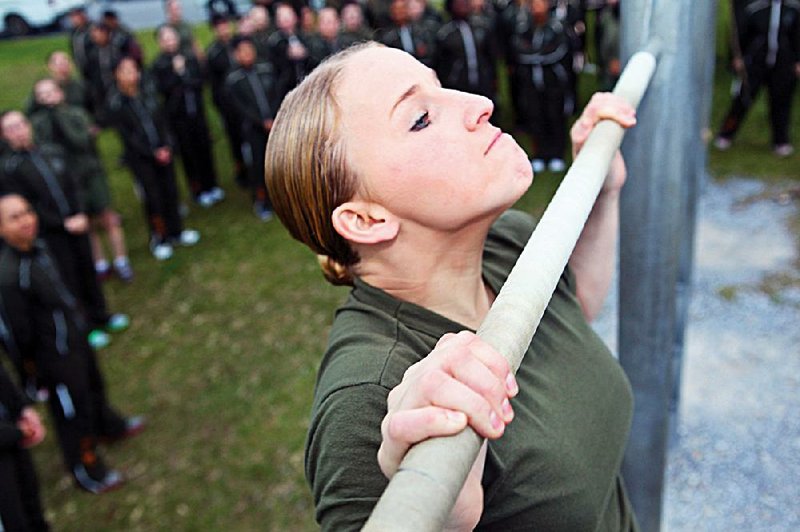As the Pentagon grapples with how to integrate women into all jobs in combat, the Marine Corps is considering something new: boosting how heavy it allows women to be so that they are able to bulk up in the gym to carry heavy loads more easily.
Commandant Gen. Robert Neller, the service's top officer, told the Senate Armed Services Committee on Tuesday that female Marines have told him recently that they are lifting weights to increase their strength. Doing so, however, has pushed some of them outside the service's limits for how much they are allowed to weigh, he said.
"Being big, strong, having a certain body mass, gives you an advantage," Neller testified. "One of the things I've heard as I've gone around and talked to female Marines is, 'Hey, I'm out working out. I'm lifting weights. I'm getting bigger. And now I'm outside the height and weight standards. Are you going to change the height and weight standards?'"
In a brief interview afterward, Neller told reporters that he called for a review of male and female standards that will be completed by July 1 and will assess a variety of related criteria, including the service's height and weight standards and how it scores Marines on its two fitness tests. It's important, Neller said, to make sure that fit Marines are not penalized.
"I think people are just bigger" than they used to be, he said. "And I think part of it is the exercise, whether it be CrossFit or weight lifting or just general fitness. I think people in this country are just bigger, and I think fortunately we've got big, strong Marines."
Defense Secretary Ashton Carter decided in December to open all jobs to women. He did so despite the Marine Corps lobbying to keep closed some physically demanding jobs, like machine gunner and reconnaissance man.
The service did so citing a nine-month study that it carried out last year at Camp Lejeune, N.C., and Twentynine Palms, Calif., to assess how women perform when integrated into units that are typically all men. It found that, on average, women who participated were injured twice as often as men, were less accurate with infantry weapons and were not as good at removing wounded troops from the battlefield.
The newly opened jobs, like infantryman, regularly call for Marines to carry more than 100 pounds on their backs. Other jobs, like tank crewman, require them to load rounds of ammunition or weapons that can weigh dozens of pounds each.
The research, which included about 300 men and 100 women, has been criticized by Navy Secretary Ray Mabus and other advocates of full-gender integration for not specifying how the top women performed. But it did offer specifics on the women involved, noting that they weighed on average 142 pounds with 24 percent body fat. Men in the group weighed 178 pounds on average with 20 percent body fat.
According to height and weight standards published by the Marine Corps in 2008, the maximum weight for women who are 5-foot-3 is 141 pounds. Taller women are allowed to weigh more, with the weight limit set at 164 pounds for a woman who is 5-foot-8 and 184 for a woman who is 6 feet tall.
By comparison, male Marines are allowed to weigh more but must maintain a lower body fat composition. A man in the service is allowed to weigh up to 180 pounds at 5-foot-8, and up to 202 pounds at 6 feet tall. Waivers can be granted to men and women who are over those limits if their commander approves the waivers, but it's a process that has long left some Marines uneasy.
The service also has specific criteria for body fat composition. For example, a woman who is 26 or under is allowed to have up to 26 percent, while a man that age is allowed to have up to 18.
Neller said he already sees male Marines who fall outside of weight regulations but have body fat that rivals professional athletes.
"These guys are big," he said. "I ask, 'Are you within weight for your height, and they just laugh at me. They say, 'No.' And I say, 'What's your body fat?' And they say, 'Fifteen.' That's like NFL-caliber."
SundayMonday on 02/07/2016
